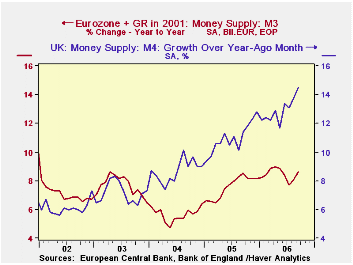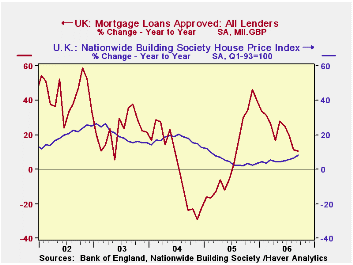 Global| Oct 30 2006
Global| Oct 30 2006Renewed Interest in the Money Supply??
Summary
With the exception of the European Central Bank, which explicitly uses the money supply to gauge inflation, most central bankers have down played the role of money in forming monetary policy in recent years. In fact, in the United [...]

With the exception of the European Central Bank, which explicitly uses the money supply to gauge inflation, most central bankers have down played the role of money in forming monetary policy in recent years. In fact, in the United States, the Board of Governors of the Federal Reserve System discontinued publication of its money supply measure--M3-- on March 23, 2006, stating that M3 had not played a leading role in monetary policy process for many years.
There is some indication that more emphasis is beginning to be placed on the role of money in the economy by at least one central bank. In the United Kingdom, the Governor of the Bank of England (BOE), Mervyn King, recently referred to the rising money supply as a factor increasing inflationary pressures. Indeed, M4, the preferred measure of the money supply in the UK, has been rising at year-over-year levels in excess of 10% since May of 2005. The latest increase in September was 14.4%, the highest rate of increase since September, 1990. This in spite of the 25 basis point rise in the BOE's key interest rate to 4.75% on August 3rd. The year- over-year increases in the money supply in the UK and the Euro Zone are shown in the first chart.
Plentiful and relatively easy money fuels investment in real assets and in the financial markets. If excessive, there is the danger of creating bubbles. Although the housing market in the UK has cooled off from the fevered activity of the last half of 2005, the August interest rate increase has failed to dampen renewed activity in the housing market as attested by the unexpected rise in mortgage approvals in September. Housing prices have also been gaining strength since early this year. In September the price of the average house was up 1.3% from August and 8.3% from September, 2005. The year-over-year changes in the value of mortgage approvals are shown in the second chart.
Should the Monetary Policy Committee of BOE announce an increase in its key interest rate when it next meets on November 9th, it is likely that the persistent rise in the money supply will have played a role in the decision.
| Sep 06 | Aug 06 | Sep 05 | M/M % | Y/Y % | 2005 % | 2004 % | 2003 % | |
|---|---|---|---|---|---|---|---|---|
| Money Supply | ||||||||
| UK M4 (Bil. Pounds) | 1,459 | 1,434.8 | 1,275.2 | 1.70 | 14.43 | 12.66 | 8.75 | 7.18 |
| Euro Zone M3 (Bil Euros) | 7,564.7 | 7,464.7 | 6,966.0 | 1.34 | 8.59 | 8.17 | 6.38 | 6.50 |
| UK Mortgage Approvals (Mil Pounds) | 30,254 | 29,457 | 27,314 | 2.70 | 10.76 | 6.17 | -1.21 | 22.78 |
| UK House Prices (Q1,1993=100) | 336.8 | 332.5 | 311.1 | 1.29 | 8.26 | 5.13 | 17.10 | 19.47 |





